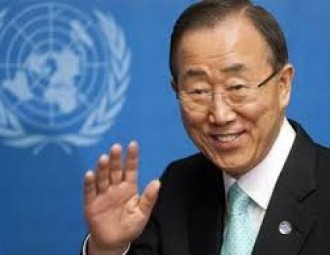UN Secretary-General praised Lukashenka

UN Secretary-General Ban Ki-moon met with Belarus Prime Minister Mihail Miasnikovich.
“I would like to note the wise policy of the Belarus president with regard to the situation in Ukraine. The ceasefire has been brought about only thanks to the accord that was signed in Minsk. Your relations with both Ukraine and Russia put Belarus in a very good position. I hope that the open dialogue will help improve the situation,” said the UN Secretary General Ban Ki-moon as he met with Prime Minister of Belarus Mihail Miasnikovich in New York on 21 September, BelTA informs.
Mikhail Miasnikovich underlined the role of the United Nations Organization in settling conflicts, which was confirmed by recent events. “We maintain very tight relations with Ukraine. Not only Belarus' leadership but the general public are concerned about the situation and provide all the help they can,” noted the Prime Minister. In his words, among other things Belarus helps the Ukrainians, who have moved to Belarus due to the conflict, to find homes and jobs.
The Prime Minister stressed than thanks to the sincere dialogue in Minsk the situation had been reversed and had been channeled towards peace, with the scale of active armed warfare going down. “The Belarusian side takes an active part in discussing ways to get out of the crisis. We are glad that the sides in the conflict hear our voice. We are confident that the conflict will be resolved in the near future. We have moved past the peak of the conflict already. The dialogue continues, people have started hearing each other, their views are getting closer,” Mikhail Miasnikovich was convinced.
The successful implementation of the framework program on development assistance in 2011-2015 was also noted during the meeting. The Prime Minister suggested considering the possibility of deploying highly qualified experts in the area of economics and social and economic development in Belarus within the framework of a new program.
Russian President Vladimir Putin also approved of the work of the Minsk Contact Group for Ukraine when discussing the situation in Ukraine, ITAR-TASS writes.
“Both sides praised the agreements on the general ceasefire in the southeast of Ukraine that were reached at a meeting of the Contact Group for Ukraine in Minsk. The sides expressed readiness to assist in every possible way the peace process consolidation,” the Kremlin said.
-
03.01
-
07.10
-
22.09
-
17.08
-
12.08
-
30.09








































